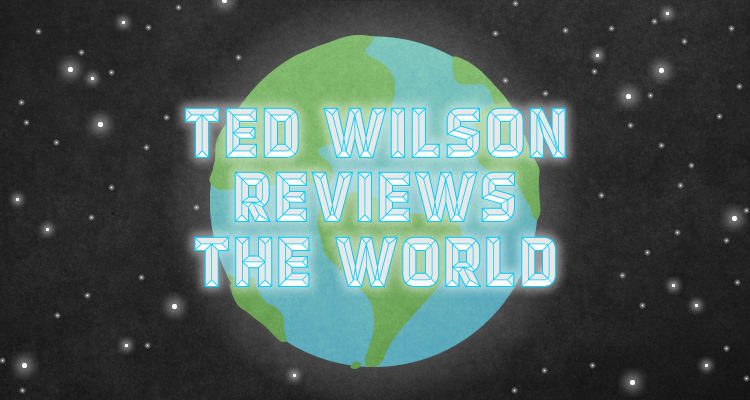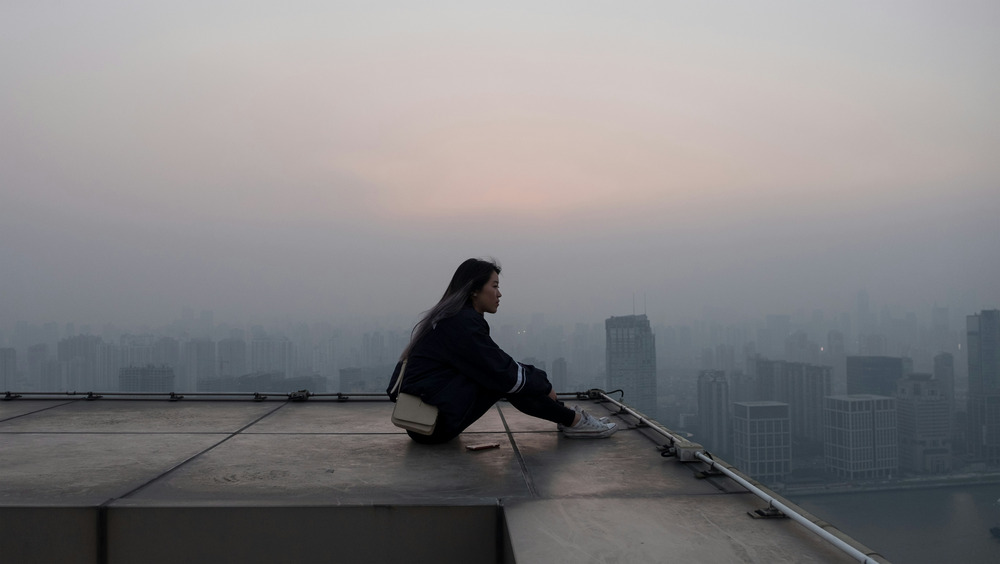Reading Lists
34 Books by Women of Color to Read This Year
Searching for unicorns in publishers’ catalogs

This list began with a mistake. I’d started collecting the titles of intriguing 2017 books: to read them, of course, but also because I hoped to review more prose in 2017. I soon noticed, though, that the writers I’d assembled in my private most-anticipated roll call bore an alarming resemblance in one respect to lists everywhere, not just the book-related kind (cf. editorial slates, boards of directors, tables of contents): the men outnumbered the women.
So, I tried to right the balance; before long, I did. Good! But then, looking again at the expanded list, I realized that most of the women writers I’d added were white. I love white women’s books, and I love books by men, but I wanted to read women of color, too. I consulted others’ lists. I trawled through publishers’ catalogs. What I discovered was that if I excluded books by friends, as well as titles my agent and/or novel editor had worked on, there wasn’t much else I could find. I didn’t have this problem with male writers of color, and I didn’t have this problem with white women. I wasn’t hunting for unicorns.
This was during the winter holidays: I was in a cabin, laid up because I’d sprained my ankle. With the unexpected glut of free time, I took to social media, asking what 2017 books others were looking forward to reading. I emailed friends; I pulled up more catalogs. In the end, I’d compiled a more robust lineup. It then occurred to me that other readers and reviewers who also care about diversity in books might like having such a list.
(If you don’t care: oh, where to start. A xenophobic, misogynistic fascist is president; hate is ascendant; and it’s easiest to forget the shared humanity of people whose lives we haven’t tried imagining. Studies show, for instance, decreased homophobia among Americans who have so much as watched a bit of Will & Grace. Inclusion has real consequences, and if you’re looking for the perfect gift to buy your Republican uncle or your racist cousin, here’s a shopping list.)
These are 34 anglophone prose books of 2017 I’m very excited to read that happen to be written by women of color: maybe not unicorns, but also not nearly as easy to find as they should be. I intend to be “greedy and indulgent,” as Jenny Zhang beautifully puts it, in reading these writers — join me?
JANUARY

Fever Dream by Samanta Schweblin
Samanta Schweblin, one of Granta’s Best Young Spanish-language Novelists, wrote this book entirely in dialogue, as a conversation between a dying woman and her friend’s son. It’s an inventive literary thriller powered by two mothers’ great love for their children, as well as the terrible fears that come with love.
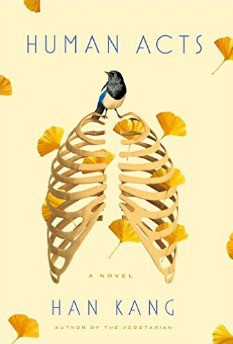
Human Acts by Han Kang
Han Kang’s Booker Prize International-winning The Vegetarian, depicting a woman’s ferocious struggle with her family, was one of the most celebrated, and unnerving, books of 2016. Her new novel, which takes place in 1980 during the Gwangju Uprising in South Korea, is no less unsettling. During the ten-day protests, the military killed hundreds of unarmed students and civilians: Human Acts bears fictional witness to these dead, and to the travails of those who survived.

Lucky Boy by Shanthi Sekaran
The fates of a rich, infertile Indian American couple, Kavya and Rishi, become tangled with the life of Soli, an undocumented, 18-year-old housekeeper from Mexico, when Soli’s baby is taken from her and placed in foster care. To Soli, the baby’s Ignacio; to Kavya and Rishi, he’s Iggy; to all three, he’s beloved. Heartbreak is inevitable, and Shanthi Sekaran’s novel compassionately explores the varieties thereof.

Savage Theories by Pola Oloixarac
Savage Theories was a small-press bestseller when it appeared in Argentina; years later, it’s finally out in the U.S., translated by Roy Kesey. It tells the stories of Buenos Aires academics, former guerrillas, and gamers. Hari Kunzru calls it “a stunning vibrant maximalist whirlwind of a novel.”
FEBRUARY
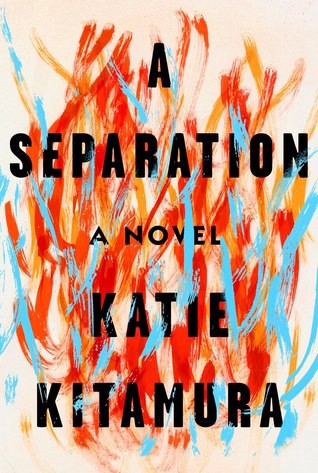
A Separation by Katie Kitamura
Katie Kitamura’s writing has captivated me for years, starting with her taut debut novel, The Longshot, about mixed-martial-arts fighters. A bookseller whose taste I love, Stephen Sparks of Point Reyes Books, read a galley of A Separation and said that Kitamura is America’s answer to Javier Marías; I’ve been waiting for her new novel ever since. In A Separation, a translator travels to a Greek fishing village to find her adulterous husband: I’m impatient to follow her there.

Tell Me Everything You Don’t Remember by Christine Hyung-Oak Lee
Christine Hyung-Oak Lee is another writer I’ve been reading for years, via short pieces in Buzzfeed, The Rumpus, and elsewhere. Tell Me Everything You Don’t Remember is a memoir about the stroke Lee endured when she was 33. It left her with no short-term memory, for months, and she wrote daily in her notebook to preserve a time she couldn’t otherwise recall. Those entries inform this book, Lee’s first.
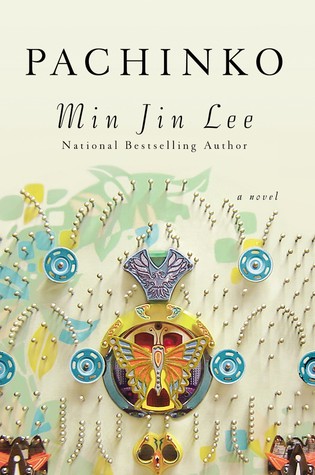
Pachinko by Min Jin Lee
Min Jin Lee had the initial idea for what would become Pachinko in 1989: in college, she attended a talk by an American missionary who worked with ethnic Koreans in Japan, historically a marginalized group. She began writing fiction about Korean Japanese in 1996; then, when she lived in Tokyo for four years in 2007, she restarted her novel-in-progress. Almost 30 years in the making, Pachinko is a testament to Lee’s determination to give voice to lives that have been, as she’s said in an interview, “denied, erased, and despised.” Junot Díaz says that Pachinko “confirms Lee’s place among our finest novelists.”
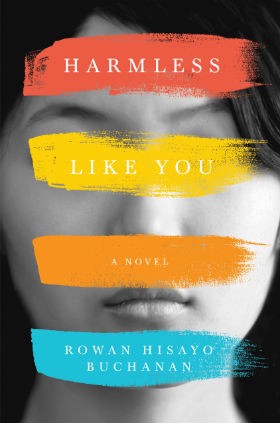
Harmless Like You by Rowan Hisayo Buchanan
I first read Rowan Hisayo Buchanan’s fiction in Granta, a short piece featuring a ghost couple stuck for eternity on the grounds of the beach resort where they died. It’s a moving, weird, funny story that has stayed with me; her debut novel, about a Japanese American artist who’s abandoned her son, promises to be just as memorable.

Tell Me How It Ends by Valeria Luiselli
Tell Me How It Ends is an essay structured around the 40 questions Valeria Luiselli translates and asks in New York City immigration courts, where she volunteers on behalf of undocumented Latin American children facing deportation. “I felt this book in the tug behind my eyes, in these hands shaking, in this heart beating too quickly. This is a book I will share with everyone I know. This is something every American needs to face, and to feel,” says Kenneth Coble of King’s Books.

Swallow the Fish by Gabrielle Civil
Swallow the Fish is described as a memoir in performance art that combines “essays, anecdotes, and meditations with original performance texts.” Not quite sure what this means? Me, neither, but I’m all for difficult-to-summarize hybrid books, and my curiosity’s piqued.
MARCH
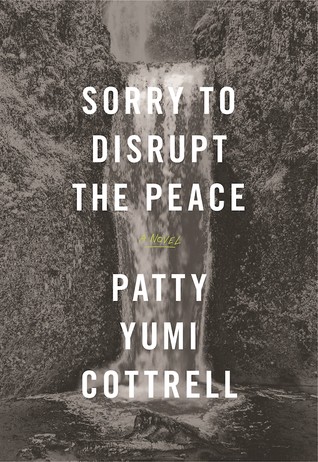
Sorry to Disrupt the Peace by Patty Yumi Cottrell
I was introduced to Patty Yumi Cottrell’s fiction in BOMB; since then, I’ve been on the alert for more. Cottrell’s first novel is narrated by a woman in her 30s whose adoptive brother has killed himself: she flies home, to her adoptive parents, to try to understand what happened. Jesse Ball says Sorry to Disrupt the Peace “is not a diversion — it’s a lifeline.”
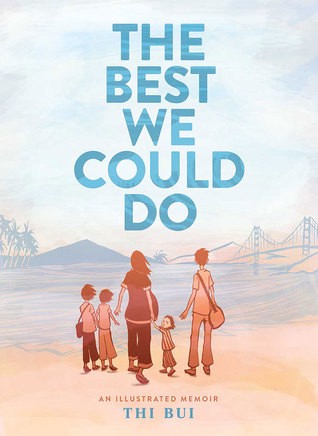
The Best We Could Do by Thi Bui
This graphic memoir about an immigrant family from Vietnam comes praised by Viet Thanh Nguyen as “a book to break your heart and heal it.” In the days after the unconscionable Muslim immigration ban, I find I’m especially drawn to books, like Bui’s, about the stark challenges faced by refugees and other migrants. The family portrayed in The Best We Could Do escapes the fall of South Vietnam in the 1970s, and the story that results is by turns comic and tragic.
APRIL

What It Means When a Man Falls From the Sky by Lesley Nneka Arimah
Lesley Nneka Arimah, a Caine Prize finalist, has been publishing odd, wondrously imagined stories in The New Yorker, Catapult, and other publications, and it’s a delight to see her writing will soon be out in book form. What It Means When a Man Falls from the Sky, which features supernatural phenomena such as children made out of human hair, is heralded by Laura van den Berg as one of the best collections she’s read in years.

Too Much and Not the Mood by Durga Chew-Bose
For those of us who have been reading Durga Chew-Boses’s intelligent essays about identity, solitude, art, and culture for years, Too Much and Not the Mood has been long awaited. This collection of essays, letters, and what’s been termed “essay-meets-prose poetry” is inspired by Virginia Woolf’s diaries and Maggie Nelson’s Bluets: yes, please.

No One is Coming to Save Us by Stephanie Powell Watts
Stephanie Powell Watt’s debut novel follows a man returning home to North Carolina to pursue his high school sweetheart. Watts has described No One is Coming to Save Us as “The Great Gatsby set in rural North Carolina, nine decades later, with desperate black people”; Edward P. Jones says it’s “full of characters who come into a reader’s mind and heart and never leave.”
MAY
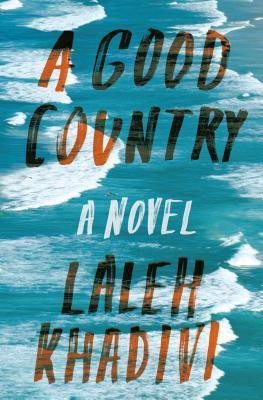
A Good Country by Laleh Khadivi
I heard Laleh Khadivi read from A Good Country last fall, and thought then it was a novel our country needs; how much more so now, as we contend with every last bit of recent political news. Khadivi’s third novel is about the radicalization of an American who’s never quite felt at home.
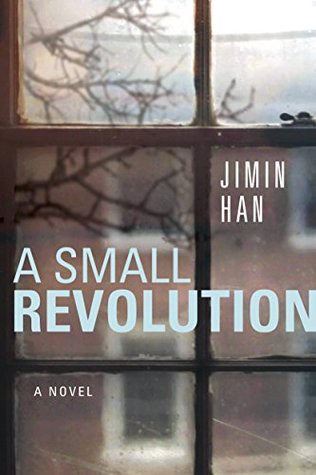
A Small Revolution by Jimin Han
A Small Revolution gets inside the head of Lloyd Kang, a fictional Pennsylvanian gunman who holds college students hostage in a dorm room. Julie Iromuanya extols it as a gripping book that “explores the volatile space between love and loss, desperation and deed.”
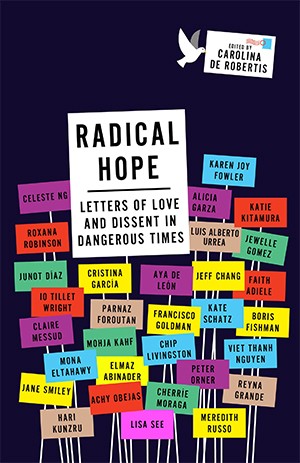
Radical Hope edited by Carolina De Robertis
With contributions from writers, activists, and thinkers such as Viet Thanh Nguyen, Junot Díaz, Patrisse Cullors, Opal Tometi, and Alicia Garza, the novelist Carolina De Robertis has assembled a collection of letters that will, she hopes, provide “messages of love and thoughts for how to continue to burn brightly and continue to work for a better world in these times.” She conceived of Radical Hope three days after the 2016 elections, and would like the book to be “an antidote to despair” because “despair paralyzes us, and we need to not be paralyzed right now.” I think I’m going to want to read this Baldwin-inspired collection yesterday, now, and through the conceivable future.
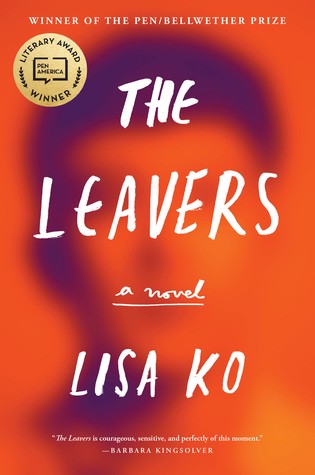
The Leavers by Lisa Ko
This novel by a founding editor of Hyphen is about an undocumented Chinese immigrant who disappears, and the child she leaves behind. The Leavers is the recipient of the 2016 PEN/Bellwether Prize awarded by Barbara Kingsolver for fiction that is socially engaged.
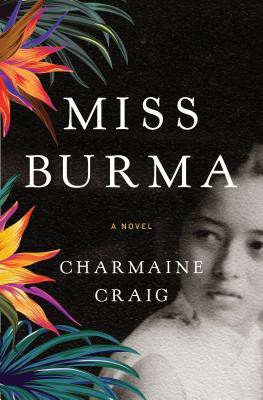
Miss Burma by Charmaine Craig
Charmaine Craig, daughter of a woman who led an insurgent army brigade in Burma, has written a novel based on the experiences of her mother and grandparents. Laila Lalami calls it “a brilliant book,” “told from the perspective of people whose voices have been systematically erased from the official record.”

Chemistry by Weike Wang
A longstanding complaint I’ve had with so-called literary fiction is that it too rarely invents mathematicians, or scientists, perhaps because most writers know little about either field. (Delightful exceptions: Catherine Chung’s A Forgotten Country, Yoko Ogawa’s The Housekeeper and the Professor, Jeanette Winterson’s Gut Symmetries.) Weike Wang’s Chemistry looks like a worthy addition to the line-up, with a science-infused story that Peter Ho Davies applauds as “a revelation — by turns deadpan and despairing, wry and wrenching, but always and precisely true.”
JUNE

Goodbye, Vitamin by Rachel Khong
I’ve admired Rachel Khong’s writing since I came across her splendid food-exploring articles in Lucky Peach. Her debut novel is about a woman whose father has Alzheimer’s disease; Lauren Groff says that “Khong is a magician,” and “we are lucky to fall under her spell at the beginning of her brilliant writing life.” I couldn’t agree more.
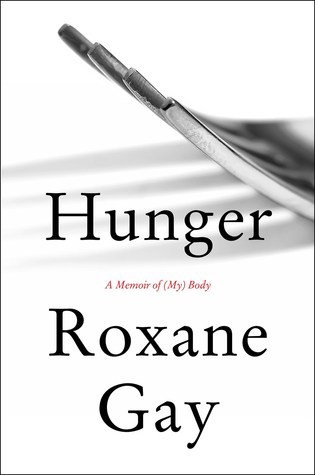
Hunger by Roxane Gay
I imagine Roxane Gay needs no introduction, but I’m especially excited to read her memoir, Hunger, about her body, food, and desire. The first, beguiling line: “This is not a book about triumph.”
JULY
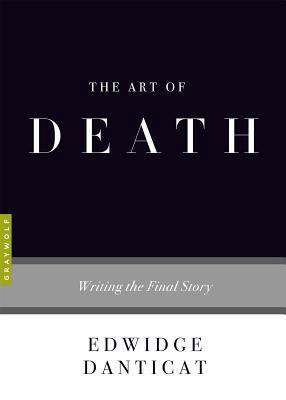
The Art of Death by Edwidge Danticat
Graywolf’s “The Art of” series has been a treasure, with incisive books on writing and criticism by Charles Baxter, Christopher Castellani, Stacey D’Erasmo, Ellen Bryant Voigt, and others. This latest addition by Edwidge Danticat is a meditation on death, and draws from Toni Morrison, Gabriel García Márquez, and the mother Danticat lost.

Refuge by Dina Nayeri
Alice Elliott Dark says she’ll keep Refuge in her “bookshelf of favorites,” and Charles Baxter calls it “essential reading.” Dina Nayeri’s newest book follows twenty years of the life of an Iranian girl separated from her father when she flees to America.

The Tower of the Antilles by Achy Obejas
Achy Obejas’s collection is about fictional Cuban migrants who never quite escape the land they’ve left. Alexander Chee on Obejas: “Obejas is a master of the human, able to conjure her characters’ heartbeats right under your fingertips, their breaths in your ears.”
AUGUST

The Sour Heart by Jenny Zhang
I get very jazzed anytime there’s something new to read by Jenny Zhang, who’s been, until now, a poet and gloriously fierce essayist. Now there’s a story collection on its way, and I find myself wondering if there’s anything the woman can’t write. The Sour Heart is the first book to be published by Lena Dunham’s and Jenni Konner’s new Lenny imprint at Random House, and portrays Chinese American girls growing up in New York City.

Home Fire by Kamila Shamsie
The third novel from one of Granta’s Best Young British Novelists, Home Fire is about divided families and jihadis’ legacies. “A good novelist blurs the imaginary line between us and them; Kamila Shamsie is the rare writer who makes one forget there was ever such a thing as a line,” says Rabih Alameddine.
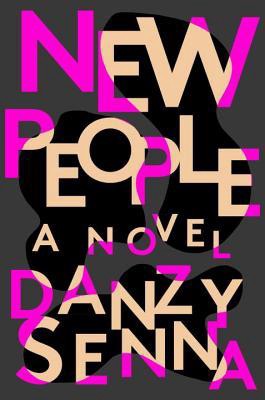
New People by Danzy Senna
“More scorcher than satire, New People loads identity, race, despair, and desire into a blender then hits high. Get ready to stay up late, to be propelled, pricked, and haunted,” says Maggie Nelson. Danzy Senna’s previous novels, Caucasia and Symptomatic, were a joy, and New People is about a woman who might have everything, but wants more.
SEPTEMBER
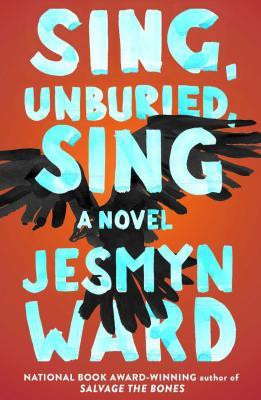
Sing, Unburied, Sing by Jesmyn Ward
Jesmyn Ward’s third novel is here at last, and it’s billed as an epic that draws from Morrison, Faulkner, The Odyssey, and the Old Testament. She received the National Book Award for her last novel, Salvage the Bones, and edited The Fire This Time, a powerful collection of essays and poems about being black in America. Her writing is consistently generous and wise; thank goodness we’ll have new words from her soon.
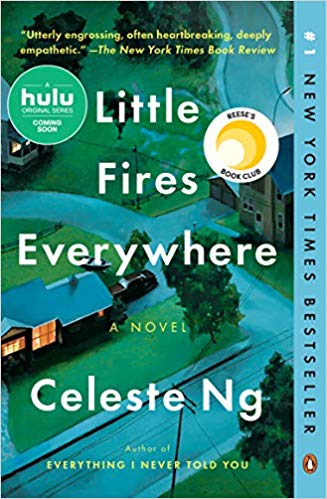
Little Fires Everywhere by Celeste Ng
I initially heard Celeste Ng’s fiction years ago at the Bread Loaf Writers’ Conference; years later, when her first novel was published, I rushed to buy it. Many readers have since shared my enthusiasm, and I’m eager to get my hands on Ng’s follow-up, Little Fires Everywhere, about a family in Shaker Heights, Ohio.
OCTOBER & LATER

Her Body and Other Parties by Carmen Maria Machado
Carmen Maria Machado’s debut collection of stories is drawing comparisons to Karen Russell and Kelly Link, and includes tales of a plague, ghosts, girls with bells for eyes, and other wonders. I’ve relished Machado’s ingenious writing a long while.
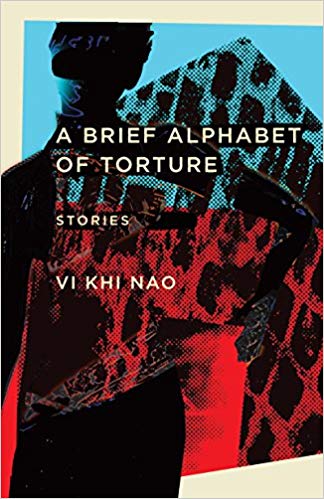
A Brief Alphabet of Torture by Vi Khi Nao
Vi Khi Nao’s Fish in Exile is the first novel I read after the 2016 elections, and I was grateful to have, as company, Nao’s strange, elliptical account of a grieving couple. A characteristically evocative line: “I watch her heels lift emptiness from the ground.” A Brief Alphabet of Torture is a story collection, the winner of FC2’s Sukenick Innovative Fiction Contest.
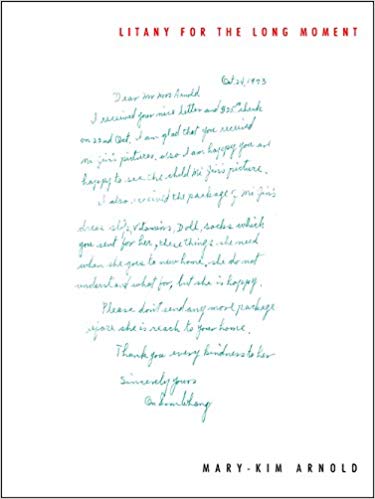
Litany for the Long Moment by Mary-Kim Arnold
In Litany for the Long Moment, Mary-Kim Arnold winds together such disparate elements as linguistics, Francesca Woodman, Theresa Hak Kyung Cha, Ronald Barthes, a visit to Korea, and her own adoption records. What results is a tripartite book of essays and a long poem, by turns a meditation, a travelogue, and an examination.




